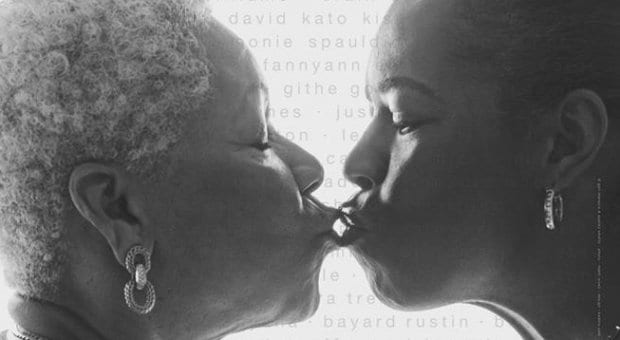Love Triumphs is the theme of Montreal’s 2014 Massimadi Afro-Caribbean LGBT International Film Festival, which is flying in South African gay couple Tshepo and Thoba Sithole-Modisane — the first gay South Africans to have a traditional Zulu wedding, in 2013 — and American lesbian power couple Gail Marquis and Audrey Smaltz, who ranked in Out magazine’s 2013 Out 100 list.
Both couples are featured in posters promoting the film festival’s sixth edition, which opens Feb 25 in Montreal.
“Gail and Audrey will be present during our lesbian day, on Friday, Feb 28, and will also join Tshepo and Thoba for a special Saturday, March 1 panel discussion about their lives and struggles,” says festival director Patricia Jean. “They come from different parts of the world but share many of the same struggles, and their life stories are an inspiration.”
“Massimadi” comes from the contraction of two Haitian Creole words: masisi, a pejorative word for fag, and madivinez, for dyke. Organizers combined them in a bid to reclaim both words when they founded Canada’s first black LGBT film festival back in 2009.
While the cash-strapped festival is still small and growing, the film screenings are rich and varied: titles include Apostles of Civilised Vice (by South African director and Treatment Action Campaign founder Zackie Achmat, exploring LGBT personalities from the colonial period to the present day,) Born This Way (a documentary about LGBT underground life in Cameroon), Friend of Essex (an homage to the late gay author Essex Hemphill), God Loves Uganda (which explores the role of the American evangelical movement in the persecution of LGBT people in Uganda) and Taboo Yardies (which looks at the perceptions that portray the island of Jamaica as a country dominated by homophobes).
“My personal highlight this year is the documentary short we filmed ourselves, called Au-delà des images (Beyond Images), about three openly gay people living in Montreal from Haiti, Rwanda and Cameroon,” Jean says. “We also screen the doc when we give sensibilization workshops for [Canadian] newcomers, students and local black associations, to help promote understanding and acceptance of homosexuality.”
Jean says Quebec’s 2013 advertising campaign fighting homophobia is another reason Massimadi is important. “There were no black people in their ad campaign,” she says. “So what’s the problem — are we being ignored? Are we not important?”
She sighs, then brightens up. “That is why this film festival is so important; black people need to see their lives mirrored in the media, in movies. That’s what Massimadi does,” she says. “Our film festival talks about our own realities, finally.”
The sixth edition of Montreal’s Massimadi Afro-Caribbean LGBT International Film Festival runs Tues, Feb 25–Sat, March 1 at Concordia University, 1455 De Maisonneuve Blvd W, and Cinema du Parc, 3575 Avenue du Parc.
massimadi.ca
facebook.com/massimadi


 Why you can trust Xtra
Why you can trust Xtra


